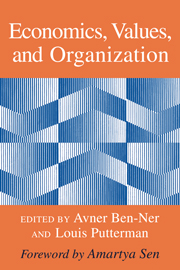Book contents
- Frontmatter
- Contents
- Foreword
- Preface
- List of contributors
- Introduction
- Part I The formation and evolution of social norms and values
- Part II The generation and transmission of values in families and communities
- Part III Social norms and culture
- Part IV The organization of work, trust, and incentives
- Part V Markets, values, and welfare
- 17 Institutions and morale: the crowding-out effect
- 18 The joyless market economy
- Epilogue
- Index
17 - Institutions and morale: the crowding-out effect
Published online by Cambridge University Press: 05 June 2012
- Frontmatter
- Contents
- Foreword
- Preface
- List of contributors
- Introduction
- Part I The formation and evolution of social norms and values
- Part II The generation and transmission of values in families and communities
- Part III Social norms and culture
- Part IV The organization of work, trust, and incentives
- Part V Markets, values, and welfare
- 17 Institutions and morale: the crowding-out effect
- 18 The joyless market economy
- Epilogue
- Index
Summary
Do economists have the right answers?
Consider the following two important policy areas:
Siting of NIMBY projects: The “Not in My Back-Yard” syndrome relates to projects which are socially desirable (they increase aggregate welfare) but which impose considerable net costs on the persons living in the vicinity where they are located. Examples include incinerators, airports, railway tracks and roads, prisons, clinics for the physically and mentally handicapped, and nuclear waste repositories. The citizens at the same time demand the completion of such projects but refuse to have them located in their vicinity. But building such a facility is not possible without local consent (see, e.g., Easterling and Kunreuther 1995; Portney 1991). In most countries, it is either extremely difficult or even impossible to find sites for NIMBY projects. In the United States, for example, hundreds of sites for hazardous waste repositories are urgently sought, but extremely few have been found (Gerrard 1994). The situation is similar in many European countries.
Economists have a handy tool to deal with such a situation. As the aggregate net benefits of undertaking the project are positive, one must simply redistribute them in an appropriate way. The communities can be induced to accept the undesired project within their borders by offering a compensation large enough to make their net benefits positive, while the other communities must be taxed to raise the sum of compensation.
- Type
- Chapter
- Information
- Economics, Values, and Organization , pp. 437 - 460Publisher: Cambridge University PressPrint publication year: 1998
- 31
- Cited by

